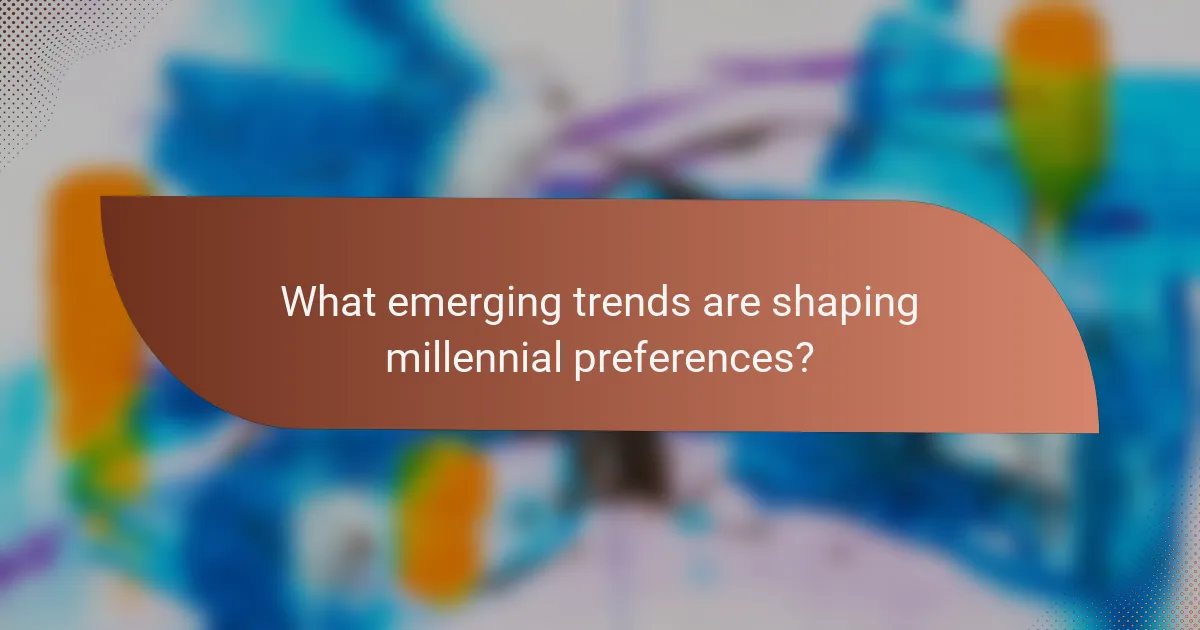Millennials are increasingly influenced by eco-conscious values in their purchasing decisions, favoring brands that demonstrate sustainability and ethical practices. This generation seeks products that not only align with their environmental beliefs but also embody aesthetic appeal and functionality, reflecting their desire for simplicity and practicality. As a result, they are drawn to items that serve multiple purposes while resonating emotionally and visually with their individual values.

How do eco-conscious values influence millennial purchasing decisions?
Eco-conscious values significantly shape millennial purchasing decisions, as this generation prioritizes sustainability and ethical practices in the brands they support. Millennials are more likely to choose products that align with their environmental beliefs, often opting for items that minimize ecological impact.
Preference for sustainable brands
Millennials show a strong preference for sustainable brands that demonstrate a commitment to environmental responsibility. This includes companies that use renewable materials, implement fair labor practices, and maintain transparency in their supply chains. Brands that effectively communicate their sustainability efforts often gain a loyal customer base among this demographic.
To attract millennial consumers, businesses should highlight their eco-friendly initiatives through marketing and packaging. This could involve showcasing certifications, using recycled materials, or participating in environmental programs.
Impact of eco-labels on buying behavior
Eco-labels play a crucial role in influencing millennial buying behavior, as they provide assurance about a product’s environmental credentials. Certifications such as Fair Trade, USDA Organic, and Energy Star can enhance a product’s appeal by signaling its sustainability. Millennials are more likely to trust and purchase items with recognizable eco-labels.
However, not all eco-labels are created equal; some may lack rigorous standards or transparency. It is essential for consumers to research the credibility of these labels to ensure they align with their eco-conscious values.
Examples of eco-friendly products
Eco-friendly products encompass a wide range of categories, from personal care items to household goods. Examples include biodegradable cleaning supplies, reusable shopping bags, and sustainably sourced clothing. These products not only reduce environmental impact but also often feature appealing designs that resonate with millennial aesthetics.
Additionally, brands like Patagonia and Seventh Generation exemplify successful eco-friendly products that combine functionality with sustainability. By offering high-quality, environmentally responsible options, these companies attract millennial consumers who value both performance and eco-consciousness.

What aesthetic appeals are most attractive to millennials?
Millennials are drawn to aesthetics that combine simplicity, emotional resonance, and functionality. They favor designs that reflect their values, such as sustainability and individuality, while also being visually appealing.
Minimalist design trends
Minimalist design resonates with millennials due to its clean lines and uncluttered spaces. This trend emphasizes functionality and simplicity, often using a limited color palette and fewer decorative elements. Brands that adopt minimalist aesthetics can attract this demographic by showcasing products that are both practical and stylish.
To effectively implement minimalist design, focus on essential features and avoid excessive embellishments. For example, furniture with sleek silhouettes and neutral colors can appeal to millennial consumers looking for modern yet timeless pieces.
Color psychology in product choices
Color psychology plays a significant role in millennials’ product preferences, influencing their emotional responses and purchasing decisions. Colors like green often evoke feelings of sustainability and health, while soft pastels can create a sense of calm and comfort. Understanding these associations can help brands tailor their offerings to resonate with this audience.
When designing products, consider using colors that align with the values and emotions you want to convey. For instance, eco-friendly brands might use earthy tones to emphasize their commitment to the environment, while tech products may incorporate vibrant colors to signify innovation.
Influence of social media aesthetics
Social media platforms heavily influence millennial aesthetic preferences, with visually appealing content driving engagement and brand loyalty. Instagram and Pinterest are particularly impactful, showcasing curated images that emphasize lifestyle and aesthetics. Brands that maintain a strong visual presence on these platforms can effectively capture the attention of millennial consumers.
To leverage social media aesthetics, brands should create visually cohesive feeds that reflect their identity and values. Engaging with users through aesthetically pleasing imagery and user-generated content can enhance brand perception and foster community among millennials.

How does functionality affect millennial product choices?
Functionality plays a crucial role in millennial product choices, as this generation prioritizes items that offer practical benefits alongside aesthetic appeal. Millennials often seek products that serve multiple purposes, ensuring they maximize value and utility in their purchases.
Importance of multi-functionality
Multi-functionality is essential for millennials, who appreciate products that can perform several tasks or adapt to various needs. This trend reflects a desire for efficiency and minimalism, as consumers aim to reduce clutter and simplify their lives.
For example, a kitchen appliance that combines a blender, food processor, and juicer can save space and money, making it more appealing to eco-conscious buyers. Brands that emphasize versatility in their designs often attract this demographic more effectively.
Durability and quality expectations
Millennials expect products to be durable and of high quality, as they prefer to invest in items that will last rather than frequently replacing cheaper alternatives. This preference aligns with their eco-conscious values, as longer-lasting products contribute to reduced waste.
When evaluating durability, millennials often look for materials that are sustainable and resistant to wear and tear. Brands that communicate their commitment to quality and sustainability can build trust and loyalty among this consumer group.
Examples of functional products
Functional products that resonate with millennials include items like modular furniture, which can be rearranged or expanded to fit different spaces and needs. Smart home devices that integrate various functions, such as lighting control, security, and energy management, are also popular.
Additionally, eco-friendly clothing made from recycled materials that can be worn in multiple settings—like casual and professional—appeals to millennials’ desire for both style and practicality. These examples illustrate how functionality is a key driver in product selection for this generation.

What are the key criteria for selecting eco-conscious products?
When selecting eco-conscious products, consumers prioritize sustainability, ethical sourcing, and overall environmental impact. Key criteria include material sourcing, brand reputation, and certifications that demonstrate a commitment to eco-friendly practices.
Material sourcing and transparency
Material sourcing is crucial for eco-conscious products, as it determines the environmental footprint of the item. Look for products made from renewable, recycled, or sustainably sourced materials, such as organic cotton or bamboo. Transparency in sourcing allows consumers to understand the journey of the materials and their impact on the environment.
Brands that provide detailed information about their supply chain and sourcing practices often gain consumer trust. Check for labels that indicate responsible sourcing, such as Fair Trade or Global Organic Textile Standard (GOTS) certifications, which signify adherence to environmental and social standards.
Brand reputation and certifications
Brand reputation plays a significant role in the selection of eco-conscious products. Consumers are more likely to choose brands that are known for their commitment to sustainability and ethical practices. Researching customer reviews and brand history can provide insight into a brand’s reliability and integrity.
Certifications are essential indicators of a brand’s eco-conscious values. Look for recognized certifications such as Energy Star, USDA Organic, or Cradle to Cradle, which validate a product’s environmental claims. These certifications help consumers make informed choices and avoid greenwashing, where brands falsely claim to be eco-friendly.

How do millennials compare brands based on values?
Millennials often evaluate brands based on their alignment with personal values, particularly sustainability, social responsibility, and ethical practices. This generation tends to favor companies that demonstrate a commitment to eco-consciousness and transparency in their operations.
Brand loyalty influenced by sustainability
Sustainability plays a crucial role in brand loyalty among millennials. Many are willing to pay a premium for products from brands that prioritize environmental protection and ethical sourcing. This preference can lead to long-term customer relationships, as millennials are more likely to stick with brands that reflect their values.
Brands that actively promote their sustainable practices, such as using recycled materials or reducing carbon footprints, can significantly enhance their appeal. For instance, companies that share their sustainability goals and progress often see increased trust and loyalty from millennial consumers.
Case studies of successful eco-conscious brands
Several brands have successfully captured millennial interest through eco-conscious initiatives. For example, Patagonia is renowned for its commitment to environmental activism and sustainable practices, which has earned it a loyal customer base. Their transparent supply chain and initiatives like the “Worn Wear” program resonate well with millennials.
Another example is Allbirds, a footwear company that uses natural materials and emphasizes carbon neutrality. Their focus on sustainability and comfort has made them a favorite among eco-conscious consumers, demonstrating that a strong environmental ethos can drive brand success.

What emerging trends are shaping millennial preferences?
Millennials are increasingly driven by values that prioritize sustainability, aesthetic appeal, and functionality. These preferences are influencing their purchasing decisions and lifestyle choices across various sectors.
Rise of second-hand shopping
The trend of second-hand shopping is gaining momentum among millennials who seek unique items while minimizing environmental impact. Thrift stores, online marketplaces, and clothing swaps are popular avenues for acquiring pre-owned goods.
This shift not only supports sustainable consumption but also allows millennials to express their individuality through distinctive fashion choices. Brands that embrace resale models or offer refurbished products are likely to resonate well with this demographic.
Impact of climate change awareness
Climate change awareness significantly shapes millennial preferences, driving demand for eco-friendly products and practices. Many millennials actively seek brands that demonstrate a commitment to sustainability through transparent sourcing and ethical production methods.
For instance, companies that utilize renewable materials or implement carbon offset programs are more appealing to this generation. Millennials often prioritize brands that align with their values, leading to a preference for products that contribute positively to the environment.
Future of eco-friendly innovations
The future of eco-friendly innovations is bright, with millennials advocating for advancements in sustainable technology and materials. Innovations such as biodegradable packaging, plant-based textiles, and energy-efficient appliances are becoming more mainstream.
As these technologies evolve, millennials are likely to support companies that invest in research and development for sustainable solutions. Brands that prioritize eco-innovation not only attract millennial consumers but also contribute to a more sustainable future.

How can e-commerce platforms cater to millennial values?
E-commerce platforms can effectively cater to millennial values by integrating eco-conscious practices, aesthetic appeal, and functionality into their offerings. By aligning their business models with these priorities, platforms can enhance customer loyalty and engagement.
Personalization based on eco-consciousness
Personalization in e-commerce can significantly enhance the shopping experience for eco-conscious millennials. This can be achieved by utilizing data analytics to understand individual preferences regarding sustainable products and practices.
Platforms should consider offering tailored recommendations for eco-friendly items, such as biodegradable packaging or ethically sourced materials. Highlighting these features can help consumers make informed choices that align with their values.
Additionally, incorporating user-generated content, such as reviews and testimonials focused on sustainability, can further personalize the shopping experience. This fosters a community of like-minded individuals who prioritize eco-consciousness in their purchasing decisions.
